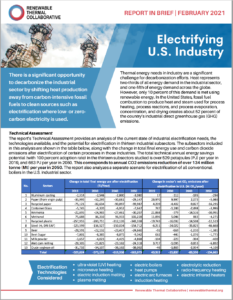Thermal energy needs in industry, especially for heat, are a significant challenge for climate change mitigation efforts. Heat represents two thirds of all energy demand in the industrial sector, and one fifth of energy demand across the globe. However, only ten percent of this demand is met using renewable energy. In the United States, due in large part to the country’s relatively inexpensive natural gas, fossil fuel combustion to produce heat and steam used for process heating, process reactions, and process evaporation, concentration, and drying creates about 52% of the country’s industrial direct greenhouse gas (GHG) emissions. However, there is a significant opportunity to decarbonize the industrial sector by shifting heat production away from carbon-intensive fossil fuels to clean sources such as electrification where low- or zero-carbon electricity is used.
In our fact sheet, we provide an overview of the major technical, economic, market, institutional, and policy barriers to scaled development and deployment of industrial electrification technologies, as well as proposals that could help to overcome these barriers. The fact sheet also describes actions and policy recommendations that can be taken by industry and others to scale up industrial electrification, given the state of the market and the institutional and policy environment described in the Technical Assessment.
Download the full fact sheet here.
To learn more, read the full report, Electrifying U.S. Industry: A Technology- and Process-Based Approach to Decarbonization, by Global Efficiency Intelligence and David Gardiner and Associates.


